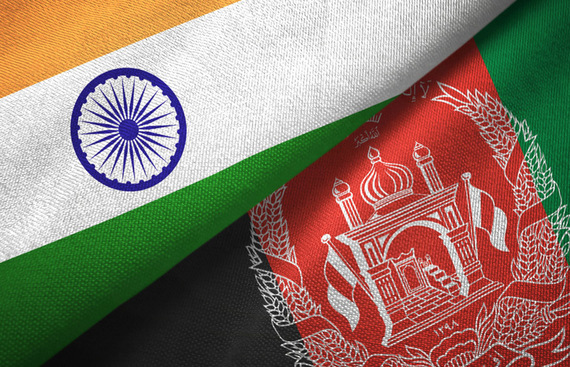India's trade investment in Taliban-led Afghanistan

The world has witnessed a strong relationship between India and Afghanistan, based on historical and cultural links. The association has its foundations in the historical contacts and interchanges between the people. Moreover, it has resulted in a healthy relation concerning trade. Since the Taliban has taken over Afghanistan, worries hovered large among countries like India that have trade aliments with war-torn countries. India has invested heavily in Afghanistan for a better future for both countries.
During the past two decades, India has invested a heavy amount in Afghanistan's infrastructure, consisting of over 400 projects across all provinces. These projects mainly focus on infrastructure, human resource development and capacity building, humanitarian assistance, community development, and improving trade through air and land networks. In addition, at the 2020 Geneva conference, India proclaimed 100 community development projects value USD 80 million and the construction of the Saudi Arabian dam in Kabul. The dam was expected to provide drinking water to two million inhabitants.
Other than the various infrastructure projects, India is an important trade partner for Afghanistan when it comes to bilateral trade. As per an agreement of 2011, Afghanistan was allowed duty-free access to the Indian market. According to 2019-20, trade exchange between the two nations was evaluated to be over USD 1.5 billion, which predominantly comprises dried fruits, vegetable products, carpets, wool and other things. India is one of the biggest export markets for Afghan, and it has shown an increase in the total worth of all exports by USD 500 million in the year 2020-2021.
Lately, India's struggling container market is fall to face a new round of challenges as shipments to Afghanistan are likely to take a hit. The shipments are getting cancel, delay and rollover as a result of the military takeover of the country. India exports a lot of sugar and other agricultural commodities to Afghan, and it could be interrupted in the upcoming days. On the other hand, India exports sugar, tea, coffee, clothing, pharmaceuticals, transmission powers, cherry, watermelon, and medicinal herbs to the South Asian nation. Afghanistan has been the second-largest purchaser of Indian sugar in the current marketing year 2020-21 (October-September) so far, buying a record 624,000 mt, as per the All India Sugar Trade Association.
The future of the projects seems vague with the Taliban-led Afghanistan. India has not had a working relationship with the Taliban in the past.
Transport and expense scenario of goods
Director-General of The Federation Of Indian Export Organisation (FIEO), Ajay Sahai, says that the imports from Afghanistan to India have been blocked because the Taliban halted cargo movement to Pakistan, from where the goods further move to India. "We keep a close watch on developments in Afghanistan. Imports from there come through the transit route of Pakistan. As of now, the Taliban has stopped the movement of cargo to Pakistan, so virtually imports have stopped," he was quoted as per ANI.
The transportation routes that traverse Dubai and the International North-South Corridor are also used for trade between the two countries. Trade experts say these transit routes are still valid. According to IE reports, banking channels between the two countries have also collapsed since the Taliban took over. As the circumstances have shifted in Afghanistan, Sahai is still optimistic about the trade relationship with Afghanistan. "I am pretty sure over a period of time Afghanistan will also realize that economic development is the only way to move forward and they will continue with that kind of trade. I think the new regime will like to have political legitimacy and for that India's role will become important for them also," DG Sahai stated in a report.
Former FIEO president and country's leading exporter S K Saraf also agreed to predict a significant fall in bilateral trade. Sharing the same insight, FIEO Vice-President Khalid Khan proclaimed there would be an absolute standstill in the trade for a specific time, as Afghanistan is a scene of chaos. "It is a landlocked country and the air route is the main medium of exports and that has been disrupted. Trade will resume only after the uncertainty will get down," Khan stated.
The organization has shown concerns over the varying prices of dry fruits in the upcoming days. It would be affecting the local merchants of the country. As India imports 85% of dry fruits from Afghanistan, Sahai further said that it might not directly impact the prices, but the very fact that one of the import sources no longer exists, assumption of rising in the process is not excluded.
Demand of a new trade policy
Biswajit Dhar, a professor of economics at Jawaharlal Nehru University, commented that India's support to Afghanistan was developing a market for indigenous products and because of the present scenario, "all this will stop".
Brijesh Goyal, chairman of the Chamber of Trade and Industry (CTI), shows his concern on the uncertain future of the bilateral trade between India and Afghanistan. As the shipments of people are in difficulties and payments of people could be stuck on a large scale. There is a need for some immediate cognizance, and some way should be found.
Considering all of the concerns, many in the trade industry believe that regularity in trade will be restored soon. Some of them are looking forward to getting introduced to any new policy. As the new establishment in Afghanistan may launch a policy that will support bolster trade. As per some sources in Afghanistan, the banks are expected to resume in 10-15 days. It might restart the sugar trade.
